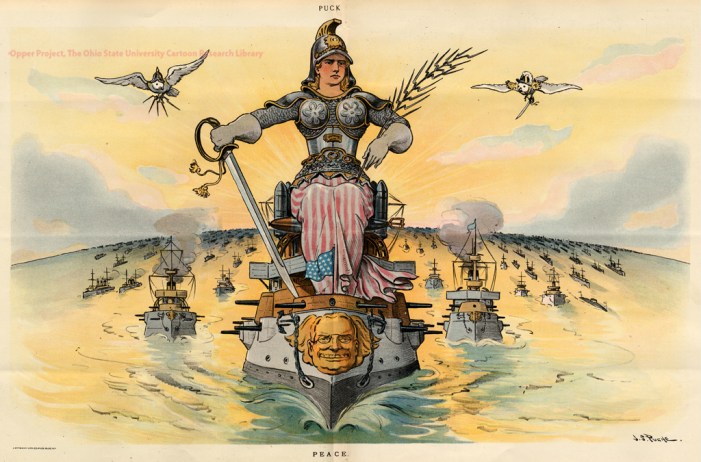Why Do They Hate Us? How the West Creates Its Own Enemies
ANALYSIS, 3 Sep 2018
Marco Carnelos | Middle East Eye – TRANSCEND Media Service
From ancient Greece onward, the West has used the Eastern other as an enemy through which to identify itself.
17 Aug 2018 – US President Donald Trump’s administration seems to be intent on confronting the rest of the world. With a few exceptions, such as Russia (as far as Trump himself is concerned), Israel and Saudi Arabia, almost every other nation in the world has felt the rage and contempt of the current American president.
Bonds with traditional US allies have been questioned and the many principles, pillars, and rules of the liberal world order, itself conceived and shaped by the United States, are now disowned.
Little knowledge
These developments can’t simply be attributed to Trump and Trump alone. The president’s thinking is shared by a significant section of the American people, who have little knowledge of the world beyond their shores and who appear inclined to believe their country is forever at threat. The grievance and bitterness Trump often trades in has a real audience.
The net result is a mobilization against alleged existential threats to the American nation, and tough policies adopted to protect it from cheating, ruthless enemies and unfair trade practices by ungrateful allies.
In one slogan, Make America Great Again or, in a more brutal one, We are America Bitch!
This Manichean and polarised view of the world is not temporary. It’s unlikely it would end if Trump were impeached, or if he were defeated in the 2020 elections.
It is, in fact, an attitude rooted in American political culture, due to two core elements.
The first is American exceptionalism. The second is more generally related to wider Western culture, dating back even to ancient Greece.
American exceptionalism?
American exceptionalism is a belief that almost any American – Republican or Democrat, pro or anti-Trump – considers part of his own political genetic code.
Henry Kissinger provides a clear definition, writing that it is the belief that American principles are “universal and that the governments that do not practice them are not fully legitimized. A notion so much rooted in the American thinking… that induces to think that a part of the world lives in an unsatisfactory, provisional, situation and that one day it will be redeemed [by America.”
Kissinger concludes that American exceptionalism is a belief that causes a situation of general, latent conflict between much of the world and the world’s superpower, the United States.
This conviction has an important corollary, which is that there cannot be any difference between the interests of the United States and the interests of mankind.
American exceptionalism is a belief that almost any American – Republican or Democrat, pro or anti-Trump – considers part of his own political genetic code.
Although eminent American scholars believe it is a myth, during the 20th century, American exceptionalism could be said to have saved millions of people from a horrible destiny.
Since the end of the Cold War, its implementation was mismanaged and there is a strong feeling that, ultimately, it veered out of control.
The second core element I referred to – relating to Western culture and dating back to ancient Greece – is the West’s tendency to define itself through its own enemies, both real and imagined.
These enemies have been geographically and mentally located in the Eastern hemisphere, a place represented as the home of despotism and barbarism, in contrast to the West and its championing of freedom and democracy, science and technology.
Negative representation
In his famous book Orientalism, Edward Said maintained that primitive as well as modern societies “seem to derive a sense of their identities negatively”. In other words, they tend to define themselves more for what they are not, than for what they are.
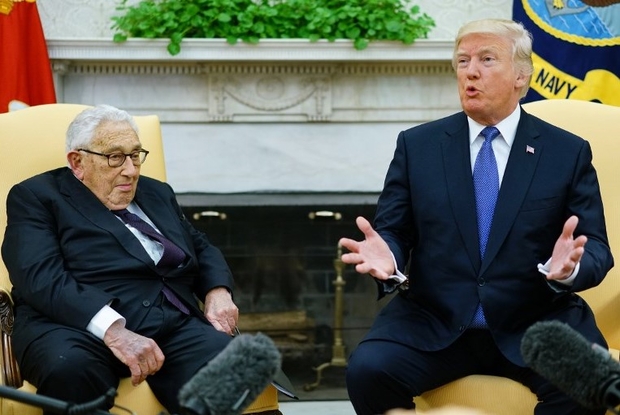
US President Donald Trump (R) speaks during a meeting with former US Secretary of State Henry Kissinger in the Oval Office of the White House on October 10, 2017 in Washington, DC.
(AFP PHOTO/Mandel Ngan)
A society’s sense of itself is thus affirmed and reinforced in comparison with societies deemed to represent its opposite. Usually, those opposing societies will be thought of as inferior and threatening.
The West seems to have looked at the East this way since Ancient times.
It is a binary distinction resulting from the dichotomous thinking inherited from Aristotelian Philosophy; this intellectual tradition has extended until today, shaping significantly not only modern Western political thought, but, most of all, how Western people think.
The negative, polarising representation of the East goes back to the fifth century BC, during the wars between Greece and the Persian Empire.
At that time, Greeks used the term “Barbarian” to refer to anyone who didn’t speak Greek.
For the most part, this meant people from eastern lands, who were considered different in terms of values and behaviors.
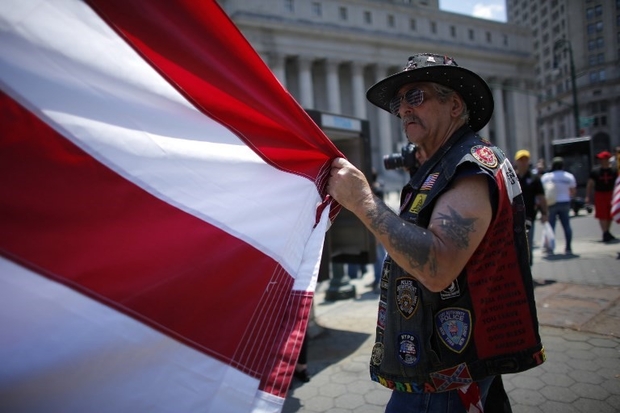
Trump supporters holds a US national flags during an anti-sharia law rally organized by ACT for America on June 10 2017 at Foley square in New York.
ACT for America has become an increasingly vocal anti-Muslim activist group, and has organized protests across the United States.
/ AFP PHOTO / Kena Betancur
Eastern enemies
The Greeks were probably the first to introduce this significant distinction from their Asian neighbors on concepts concerning the self-government of their respective societies and the relationship among their inhabitants. The conflicts with Persia reinforced the Greeks’ awareness of their differences with the eastern empire.
The Greek sense of self was boosted by comparison with the Persians and the negative features of their enemies to the east were heightened and emphasized. Victories over the Persians were celebrated on the stage in tragedies by Athenian dramatists like Aescylus.
According to the tragedies, the Athenians had prevailed because they had been united, free, disciplined and effective due to their democratic values; on the contrary, their enemies had lost because they had been just the opposite, under the despotic rule of a single person.
Herodotus, with his Histories, conveyed the same view. Later on, when Alexander the Great moved to conquer Asia, he firstly stopped in Troy to make sacrifices; a symbolic act that reinterpreted the Trojan War as a clash between the Greeks and the East, with the Trojans portrayed as Barbarians, a representation that finds no evidence in Homer’s Iliad.
Across the following centuries, this mental scheme has not changed. The East came progressively to be known in the West as its great complementary and negative opposite, a view reinforced systematically by historiography and literature.
The new religion
The rise of Islam has further increased this polarisation; with the new religion soon becoming a symbol of terror and devastation. For at least four centuries, the Ottoman Empire was considered the main threat to Europe and Christianity. Paradoxically, it was through the Islamic scholars that Europe rediscovered the classic Greek works that contributed so much to the West-East polarisation.
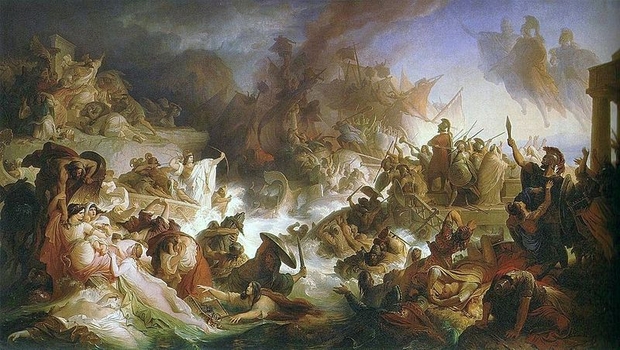
The Battle of Salamis, which took place in 480 BC between an alliance of Greek city states and the Persian Empire, as painted by Wilhelm von Kaulbach. (WikiCommons).
In the 18th and 19th centuries, European colonialism further reinforced the Western “self”, affirmed also through the famous “white man’s burden”.
The end of the 20th century saw a revival of the Eastern threat through radical Islam. Today, Eastern enemies seem to abound: Russia, China and Muslim nations, to a different degree, are all perceived as threats.
It was through the Islamic scholars that Europe rediscovered the classic Greeks works that contributed so much to the West-East polarisation.
Western attitudes toward Eastern cultures and civilizations have not been characterized only by a sense of superiority but also by a tendency to portray the relationship in Manichean terms.
It is really surprising to see how little Western language and (mis)characterization have changed over the centuries.
The phrase “Axis of Evil” is considered a modest political heritage left by former American president George W. Bush. Actually, it was probably used for the first time on 17 September 1656 by Oliver Cromwell in the English parliament, when he referred to an “axis of evil” abroad, a strange and illiberal other that was out to threaten the English way of life.
Less than twenty years before Bush used the term, Ronald Reagan was calling the Soviet Union the “Evil Empire”.
Democracy and freedom
Democracy and freedom are therefore the two fundamental principles the West is making use of in justifying its distinction from the “others”.
One of the main problems we are facing today is that the West has applied these principles with double standards, à la carte, thus weakening the credibility of the liberal order.
There have, for Western nations, been good dictators and bad dictators. Human rights violations have been viewed in different lights, depending on the perpetrator. Electoral processes have been fair and legitimate only if the winners were friends of the West.
Anyone attempting to interpret or frame freedom and democracy in a way that diverted even slightly from the Western handbook has been equated to an evil enemy with whom compromise, or coexistence, is impossible.
Former US President Bush and US mainstream media explained September 11 as driven by the hatred toward Western societies for what they were.
One of main problems we are facing today is that the West has applied the principles of freedom and democracy with double standards, à la carte, thus weakening the credibility of the liberal order.
There is some truth in this assertion, but the same Western societies have not been touched by any doubt about the possibility that, sometimes, the West could be hated for what it did, and not for what it was. These policies were enacted long before Donald Trump’s arrival in the White House.
The Western trend to portray or frame the “other” not as the simple bearer of different interests or values, but also as the incarnation of evil, is now deeply rooted in mainstream political thinking and language.
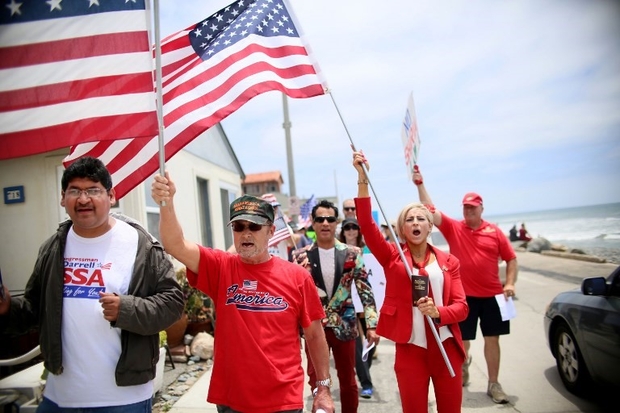
Anti Shariah Law demonstrators march along the beach during the “March For Human rights and Against Sharia law” demonstration in Oceanside, California on Saturday, June 10, 2017. (AFP PHOTO/Sandy Huffaker)
The matrix now prevailing, according to the exceptionalist handbook, is regime change.
Following the end of the Cold War, new enemies have been sought to replace old ones.
New enemies
At times, the easiness and haste with which Washington identifies new threats appear ridiculous. In the last quarter of a century, the most powerful nation in the world has framed Panama, the Serbian Republic, the tiny island of Grenada, a bunch of fanatics in an Afghan cave and a series of embattered Muslim nations as clear and present dangers to its own national security.
After the collapse of the Soviet Union, the United States, through “smart” NATO’s eastward expansion, achieved the masterpiece of recreating a broken nation like the Russian Federation as its main enemy.
Furthermore, with the recent trade offensive against China and the financial bullying through the dollar, the old alignment between the two Eurasian giants has been revived.
Binary thinking
The current international situation has become so phobic that any sober discussion on Russia, China, Israel-Palestine or Iran, to quote the most compelling cases, has become almost impossible.
Expressing doubts about the mainstream narrative on Russia’s activities leads to being labeled a stooge of Putin. Pointing out that China’s trade surpluses are in good part the result of massive industrial de-localisations carried out by top Western companies (one example for all: Apple) means to be considered a fool.
Read also ► Forty years of Orientalism, an eternity to go
Criticizing certain questionable acts of the Israeli government exposes you to the accusation of anti-Semitism.
Remembering that Iran has signed and so far respected the JCPOA, or claiming the respect of Palestinian rights supported by International Law, is collusion with terrorism.
This binary thinking – either you are with us or against us – comes from American exceptionalism and from the Western quest to identify itself through its Eastern enemies, a quest that, as I have written, goes back to ancient Greece.
When political establishments start to believe in their own propaganda, and they drive their own people to do the same – as the US did with the Iraqi’s “weapons of mass destruction” – the chances of miscalculation and, consequently, of conflict, increase.
Fundamental questions
Some fundamental questions need an answer:
Why do Western nations feel so frequently the need to believe in so many unsubstantiated stories and to envisage so many threats to their national security?
Why this constant hunt for enemies to display, prove and safeguard Western liberal values when the latter are so intrinsically strong and valid on their own?
A school of thought usually answers pointing to the US Military-Industrial Complex (MIC). It is an answer but not the answer.
We are afraid that there could be a more worrisome one: The suspicion that the real threat to the West and its values is inside the same Western societies; and that it would be reductive, to say the least, to blame everything on the last arrived, Donald Trump.
If the enemy is within us, buried in the depth in our own consciences, it could be something so difficult to accept that, in the end, we are compelled to look for it outside.
____________________________________________________
 Marco Carnelos is a former Italian diplomat. He has been assigned to Somalia, Australia and the United Nations. He has served in the foreign policy staff of three Italian prime ministers between 1995 and 2011. More recently he has been Middle East Peace Process Coordinator Special Envoy for Syria for the Italian government and, until November 2017, ambassador of Italy to Iraq.
Marco Carnelos is a former Italian diplomat. He has been assigned to Somalia, Australia and the United Nations. He has served in the foreign policy staff of three Italian prime ministers between 1995 and 2011. More recently he has been Middle East Peace Process Coordinator Special Envoy for Syria for the Italian government and, until November 2017, ambassador of Italy to Iraq.
Go to Original – middleeasteye.net
DISCLAIMER: The statements, views and opinions expressed in pieces republished here are solely those of the authors and do not necessarily represent those of TMS. In accordance with title 17 U.S.C. section 107, this material is distributed without profit to those who have expressed a prior interest in receiving the included information for research and educational purposes. TMS has no affiliation whatsoever with the originator of this article nor is TMS endorsed or sponsored by the originator. “GO TO ORIGINAL” links are provided as a convenience to our readers and allow for verification of authenticity. However, as originating pages are often updated by their originating host sites, the versions posted may not match the versions our readers view when clicking the “GO TO ORIGINAL” links. This site contains copyrighted material the use of which has not always been specifically authorized by the copyright owner. We are making such material available in our efforts to advance understanding of environmental, political, human rights, economic, democracy, scientific, and social justice issues, etc. We believe this constitutes a ‘fair use’ of any such copyrighted material as provided for in section 107 of the US Copyright Law. In accordance with Title 17 U.S.C. Section 107, the material on this site is distributed without profit to those who have expressed a prior interest in receiving the included information for research and educational purposes. For more information go to: http://www.law.cornell.edu/uscode/17/107.shtml. If you wish to use copyrighted material from this site for purposes of your own that go beyond ‘fair use’, you must obtain permission from the copyright owner.
